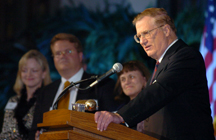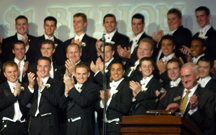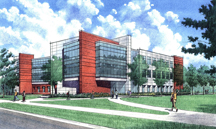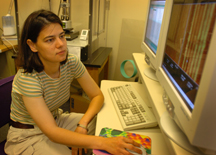
October 22, 2004
$10 million biomed engineering gift announced
Purdue fund-raising campaign tops $1 billion, goal raised
WEST LAFAYETTE, Ind. – Purdue officials today (Friday, Oct. 22) announced that the university's Campaign for Purdue has passed the $1 billion mark and that the fund-raising goal has been raised to $1.5 billion.

|
The university also unveiled a new $10 million gift to transform the biomedical engineering department into a full-fledged school.
"As of today, with nearly three years remaining in the campaign, we have already raised $1,007,323,292 – more than 75 percent of our original $1.3 billion goal," Purdue President Martin C. Jischke told alumni and friends at the annual President's Council dinner in the Purdue Memorial Union. "Your response has been amazing, and I am very, very gratified that you believe in this great university and that you feel it can be even better. "
The $10 million commitment to biomedical engineering from the Weldon family, of Evergreen, Colo., and Atlanta, will be used to hire additional faculty, support undergraduate and graduate students, and pay for other startup expenses, including research initiatives.
The biomedical engineering department, which has plans to expand into a school, will be named the Weldon School of Biomedical Engineering in honor of the family's gift. The school's naming is subject to approval by the Purdue Board of Trustees.

|
"This gift addresses the heart of our mission, which is people," Jischke said. "We can construct new buildings – which we are doing for biomedical engineering – but it's what takes place inside that is the true magic of higher education."
Construction has begun on the 91,000-square-foot, four-floor, $25 million biomedical engineering building, with completion expected in 2006. Once finished, the facility will enable Purdue to enlarge the biomedical engineering faculty from six to 20, expand the graduate program and further develop the undergraduate program, which began this fall.
It is the first biomedical engineering building at any institution in Indiana and will be located in Purdue's Discovery Park, the university's hub for interdisciplinary research located on State Street on the west edge of campus.
"The Weldons have a legacy of giving to Purdue, and their latest contribution will help Purdue and Indiana create better living through new medical treatments and diagnostics, engineering everything from advanced orthopedic and cardiovascular implants to innovative tissue grafts to heal wounds," said George Wodicka, head of the department.
Norman Weldon, who lives in Colorado, earned a bachelor's degree in agriculture in 1956, a master's degree in management in 1962 and a doctoral degree in economics in 1964, all from Purdue. A native of Kentland, Ind., he has been a friend and adviser to Purdue biomedical engineering since its inception in 1974 and was honored as a Krannert Distinguished Alumnus in 1979. He has been CEO of CTS Corp., in Elkhart, Ind., and president of Cordis Corp., in Miami, Fla. He currently is managing director of Partisan Management Group, a venture capital fund he co-founded in 1992. From 1986 to 1996 he was president and CEO of Corvita Corp., a medical device company he co-founded in 1986. The company was purchased by Pfizer Inc. in 1996.

|
His wife, Carol Weldon, studied home economics in Purdue's School of Consumer and Family Sciences. She is a native of Newton County, Ind., and serves as a trustee of the Weldon Foundation, a family foundation set up for philanthropic purposes.
The gift also is from the Weldons' son, Thomas, a Purdue industrial engineering graduate. Born in West Lafayette, Thomas Weldon is co-founder and chairman of The Innovation Factory, an Atlanta life sciences incubator. He has launched nine early-stage medical device companies, including Novoste Corp., of which he is currently chairman. He lives in Atlanta with his wife, Cheryl, and holds more than a dozen patents that have biomedical applications. In addition, he is the co-founder and chairman of Accuitive Medical Ventures, a $55 million medical device venture capital fund.
"This seems like a natural fit for me and my family to become involved. We are all Purdue graduates and are two generations of medical device entrepreneurs," Thomas Weldon said.
Added Norman Weldon, "We are making this commitment to Purdue because it reflects our business interests. Being part of a venture to grow a department into a school is innovative and exciting, much like the medical device startup environment. It represents the culmination of our longtime association with biomedical engineering at Purdue."
The Weldons will receive Crystal Boilermaker awards, which are the Purdue President's Council's highest award for philanthropy to the university. Norman and Carol Weldon also have a daughter, Cynthia, who received a bachelor's degree in industrial engineering from Purdue and an MBA from Harvard University.
Developments in biomedical engineering are part of the Purdue College of Engineering's $400 million strategic plan.

|
"The biomedical engineering program is a major factor in the state of Indiana's economic development," said Linda P.B. Katehi, the John A. Edwardson Dean of Engineering. "Indiana has grown into a globally recognized center for medical devices, including orthopedic products, diagnostics and cardiac implants, but the industry needs a steady supply of newly trained workers to continue its success."
The new building will bring together faculty, who are currently distributed across campus, into a single teaching and research environment that will house laboratories and facilities in key research areas, many of which involve partnerships with Indiana medical device and biotech companies specializing in orthopedic, cardiovascular and tissue engineering.
The Indiana General Assembly last year authorized Purdue to issue bonds to cover $13 million of the building's cost, also providing $2.5 million for the 2003-2004 fiscal year and $5 million the following fiscal year to develop the new undergraduate program and expand the graduate program.
The building's remaining cost of $12 million is being funded through private donations, including $5 million from the Whitaker Foundation, an independent foundation based in Arlington, Va. The foundation was established as a trust in 1975 to primarily support research and education in biomedical engineering. Grants are made mostly to universities and medical schools to support faculty research, graduate student education and educational program development.
Eventually, about 100 students will graduate annually from Purdue's program – 75 undergraduates and 25 graduate students.
Work carried out by biomedical engineering faculty will dovetail with and complement research at the new Bindley Bioscience Center, Birck Nanotechnology Center and e-Enterprise Center in Discovery Park.
The announcement capped a 10-day celebration that focuses on ways Purdue is improving education and helping the state of Indiana as part of its strategic plan and fund-raising campaign.
Writer: Emil Venere, (765) 494-4709, venere@purdue.edu
Sources: Martin C. Jischke, (765) 494-9708
George Wodicka, (765) 494-2998, wodicka@ecn.purdue.edu
Linda P.B. Katehi, (765) 494-5346, katehi@purdue.edu
Purdue News Service: (765) 494-2096; purduenews@purdue.edu
Note to Journalists: Video of researchers in biomedical engineering labs is available by contacting Jesica Webb, (765) 494-2079, jwebb@purdue.edu.
PHOTO CAPTION:
Purdue alumnus Norman Weldon, of Evergreen, Colo., speaks during the President's Council dinner in the Purdue Memorial Union on Oct. 22. Also pictured, from left to right, are Cheryl , Thomas and Carol Weldon. The Weldons received a Crystal Boilermaker award from Purdue President Martin C. Jischke. The Crystal Boilermaker is the Purdue President's Council's highest award for philanthropy to the university. The Weldons are providing a $10 million gift to transform the biomedical engineering department into a full-fledged school.
A publication-quality photograph is available at https://www.purdue.edu/uns/images/+2004/weldons-jischke2.jpg
PHOTO CAPTION:
Michael Birck (at podium), chairman of the Campaign for Purdue and a member of the university's board of trustees, is applauded by the Purdue Varsity Glee Club as he announces Friday (Oct. 22) that the university has increased its fund-raising campaign goal to $1.5 billion. The initial goal for the seven-year campaign, which began in 2000, had been $1.3 billion. Birck also announced during the President's Council event that the university has raised more than $1 billion with nearly three years left in the campaign. (Purdue News Service photo/David Umberger)
A publication-quality photo is available at https://www.purdue.edu/uns/images/+2004/birck-billion.jpg
PHOTO CAPTION:
This rendering depicts the 91,000-square-foot, four-floor, $25 million biomedical engineering building, which is expected to be completed in 2006. Once completed the facility will enable Purdue to enlarge the biomedical engineering faculty from six to 20, expand the graduate program and further develop the undergraduate program, which began this fall. It is the first biomedical engineering building at any institution in Indiana and will be located in Purdue's Discovery Park, the university's hub for interdisciplinary research located on State Street on the west edge of campus.
A publication-quality photo is available at https://www.purdue.edu/uns/images/+2004/biomedical-render.jpg
PHOTO CAPTION:
Albena Ivanisevic, an assistant professor of biomedical engineering and chemistry at Purdue University, reviews images related to work ultimately aimed at creating retinal transplants to treat age-related macular degeneration. Her lab eventually will be housed in the new biomedical engineering building and also is associated with the Birck Nanotechnology Center and the Bindley Bioscience Center, both in Purdue's Discovery Park. (Purdue News Service photo/David Umberger)
A publication-quality photograph is available at https://www.purdue.edu/uns/images/+2004/ivanisevic-weldon.jpg
To the News Service home page